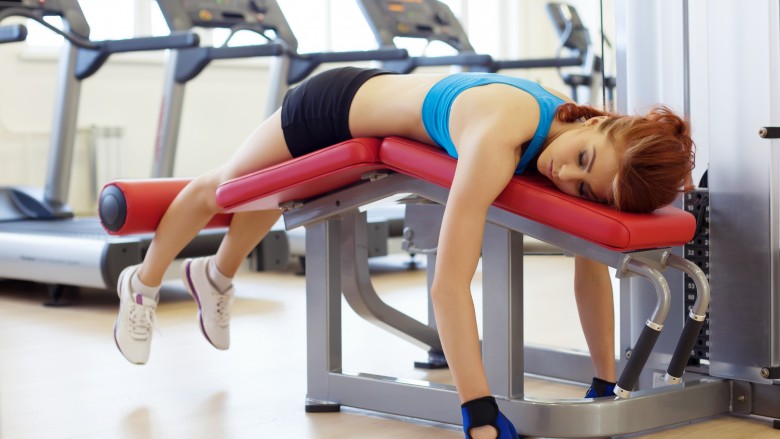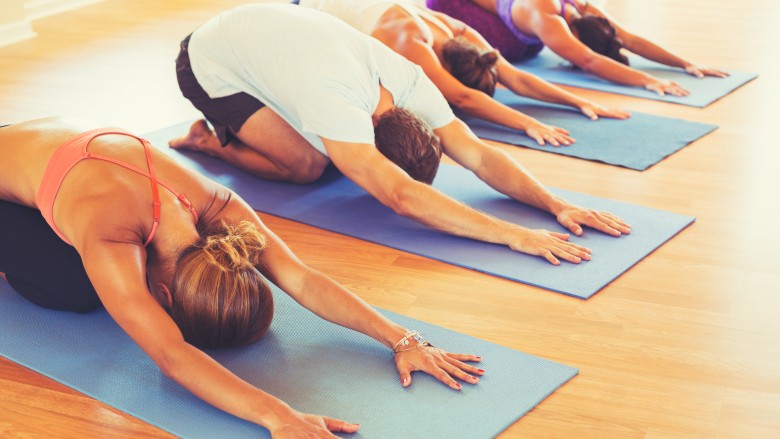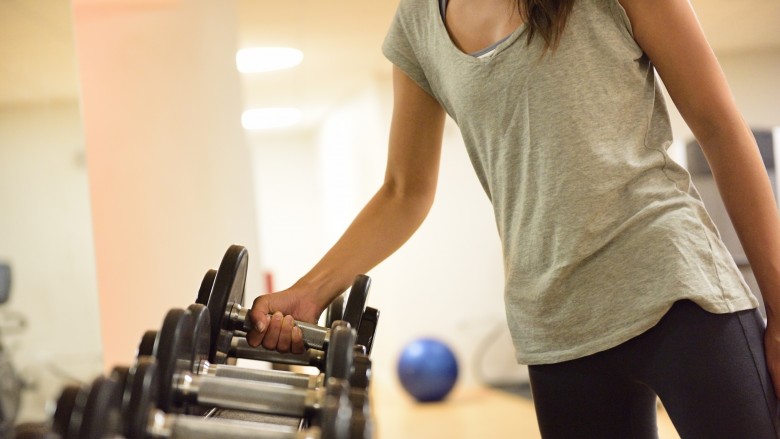10 Signs You're Doing Too Much Cardio
Cardio exercise is amazing for our bodies. Running, cycling, and swimming help us build endurance and give us a nice boost in our days. Cardio exercise prevents chronic disease while improving our heart health. However, like anything else, there can be too much of a good thing. Cardiovascular exercise puts stress on our hearts. A moderate amount helps strengthen our heart muscle, but too much cardio can actually weaken it. If you're worried you've been hitting the gym a little too hard, read on for 10 signs that you need to cool it on the cardio.
Wait, I thought cardio was good for me
It's not the actual exercise that is the problem, so much as the amount of it. You'd be hard-pressed to find a physician or healthcare provider who does not recommend some cardio exercise. Our bodies are designed to move, and it's important to stay active. Physical exercise has actually been found to be just as, if not more, effective as medication for some chronic conditions. Cardio exercise has been shown to prevent heart disease, high blood pressure, obesity, diabetes, and even depression. People who exercise regularly live an average of seven years longer than their sedentary friends!
The problems come when you're constantly doing cardio and never giving your hot bod a chance to rest and recover.
You're not losing fat
Many of us start increasing our cardio when we feel like we need to shed a few pounds. If you've been running everyday and are still wondering where your beach body is, it may be time to put away the running shoes. Cardio exercise can help our muscles burn fat during the workout, but our metabolisms quickly go back to normal.
The other issue is that chronically doing too much cardio can lead to actually losing muscle. Fitness and weight-loss coach Dave Smith told the Huffington Post that because cardio is not the most effective fat-blasting workout, you'll have to keep doing more and more if you want to see weight loss. However, as you do more cardio, your body could lose muscle mass, which leads to a slower metabolism. "If your body loses even the slightest bit of muscle, your resting metabolic rate (i.e. how many calories you burn when you're NOT exercising) dips even further," he explained. "Your body will begin to shed fat even more slowly... unless you do even more cardio." If you've been stuck in this exercise cycle, it's time to shake things up and step away from the treadmill.
You're training for another marathon this year
Running a marathon is an incredible accomplishment — just don't keep running them with no breaks. Chances are you or someone you know have run a marathon recently. Over the past 35 years, the number of Americans running marathons has increased 20-fold. Running a marathon is truly something to be proud of, but it's important to let your body rest. If you're continually running marathon after marathon, it will take a serious toll on your heart.
A study in Mayo Clinic Proceedings found that extreme athletes like marathoners and triathletes have some serious changes going on in their hearts during training. Their hearts do not work as efficiently and even the size changes. The heart can go back to normal one week after the big race, but if you're constantly stressing your heart with long runs or swims, it can never truly recover.
There are even those sad stories of marathoners collapsing at the end of their race. Sudden cardiac death is not common for marathoners. About one per 100,000 will experience it, and it will most likely happen during the final mile of the race. While this sounds scary, it doesn't mean you have to give up your dream of completing a marathon. Just listen to your body and schedule lots of rest.
You're a triathlete
If those marathon statistics have you looking for a new sport, steer clear of triathlons. Triathletes actually have double the mortality rate as marathoners. This is most likely due to the fact that if you collapse during a marathon, you hit the ground, but if you do so during the swim portion, drowning is a scary possibility.
Researchers at the Mayo Clinic are clear that these small risks should not keep anyone from going after their dreams of completing an endurance race. However, it's vital to listen to your body and make sure to take plenty of rest days both during training and especially after the race.
You're always sore
Like any exercise, doing too much cardio can lead to injuries. These may be major overuse injuries or more minor ones. Often we try to just push past a little soreness, but any pain should be addressed right away.
"If you are dealing with chronically achy or creaky joints, then your body might be asking for a change of pace," Dave Smith told the Huffington Post. "Chronic joint soreness develops gradually so it can be easy to overlook. You might not suddenly notice a drastic change in how your body feels, but cardio overload may be taking a toll on your joints without you realizing it." Pay attention to how you feel after your run. Sore knees? Make sure to take a rest day or hit a yoga class instead.
The more cardio you do, the more you'll probably want to push through the pain and keep going. No matter how fit you are, it's important to pay attention to pain. "Sometimes you need to back off and take it easy in order to keep making progress," John Gaglione, a strength coach, fitness expert, and founder of GaglioneStrength, told Shape. "The more fit and the stronger you become, the more recovery you need."
You can't lose that belly
If you and your friends have decided to run a 5K together to get ready for summer pool days, you may be disappointed come June. While many of us start a new workout regimen to get fit, it takes more than a run to transform your body. Cardio alone can't touch that stubborn belly fat.
Studies show that you need to incorporate strength training into your workout routine to burn fat. As you build up and strengthen your muscles, they'll be burning fat far beyond your workouts. Running or cycling alone can't offer that. "The more muscle you have, the more energy your body expends," women's strength expert Holly Perkins, CSCS told Fitness. "Everything you do, from brushing your teeth, to sleeping, to checking Instagram, you'll be burning more calories."
You can't sleep
If you've ever talked with your doctor about problems sleeping, the first thing she probably recommended was exercise. Moderate physical activity during the day can prevent or even cure insomnia. We have to move our bodies throughout the day to stay healthy and sleep well.
However, new research has shown that too much exercise can lead to problems sleeping. Turns out that over-exercising can increase stress hormones like cortisol. Come bedtime, those stress hormones can keep you up tossing and turning. If you've been staring at the clock all night, think about cutting back on your gym time and see what happens.
You still can't get that definition
Working out everyday, but still not seeing that toned definition you're craving? You may be doing the wrong kind of workouts. Yes, cardio can lead to weight loss, but it's not going to give you those sexy curves. "Using cardio exercise as your primary form of exercise can "shrink" your body but still leave you with a soft, undesirable physique," Dave Smith told the Huffington Post. Smith explains that cardio is effective at reducing both fat and muscle mass. Most of us want to ditch the fat, but keep our toned muscles. "In other words, all that work on the treadmill might make your body into a smaller version of what it was before instead of completely revamping your body's shape," Smith said. "This can be a frustrating side effect of doing too much cardio exercise."
You start dreading your workouts
If you're concerned about doing too much cardio, it's safe to say you enjoy your exercise routine. Even if you don't love every minute of your visit to the gym, you're probably the type of person who needs to workout or she just feels "off." If you've always been a happy little gym rat, then take note if you suddenly don't feel like doing it anymore.
"If you feel a suddenly absence of motivation, or the thought of exercising isn't exciting, that's a good sign you need to take a break," says John Gaglione. We humans need variety to stay motivated, so don't keep forcing yourself to run on the treadmill if you hate it. Try a Zumba class or go for a walk with friends. Keep changing things up to keep it fresh.
You feel tired all the time
Cardio exercise is great for giving you some much-needed energy. If you tend to doze off at work at lunch, try going for a brisk walk instead of reaching for another cup of coffee — or even worse a chocolate goody from the vending machine. However, if you notice that you're starting to feel tired all of the time, it may be time to pull back on the cardio.
Moderate exercise is a good stress on the body. It causes our muscles and bones to strengthen. If the body gets too stressed though, then excessive cardio will leave us depleted and wiped out.
You just feel off
Many of us need our workouts to feel energized and happy. When I'm stressed, nothing clears my head like a long run in the park. However, if I'm forcing myself to run everyday and still not feeling like myself, it's time to try something new.
If you've been noticing some feelings of the blues, try switching up your workouts. Take a break from the constant running and try a new fitness or yoga class. Or try some strength training to really break out of your funk. Research shows that lifting weights is linked to reduced anxiety and depression symptoms. "Strength has a funny way of bleeding into all areas of your life, in the gym and out," Jen Sinkler, an Olympic lifting coach, kettlebell instructor, and author of Lift Weights Faster told Fitness. "Weight lifting empowers you."
Try yoga instead
So you've come to the conclusion that you're doing too much cardio. Now what? Let's make a plan. Look ahead at your week, and start substituting some new workouts and rest days. A yoga class is a great place to start.
If you haven't tried yoga yet, it's time. Not only will it improve your health, but you'll start to feel amazing as well. Yoga is a combination of stretching, strengthening, and finding some stillness in our crazy lives. Yoga has been shown to be just as effective as cardio exercise in keeping us healthy and preventing chronic diseases. It also does not come with the downsides of overdoing it on the cardio.
Strength training is the answer
Looking for something a little more challenging than yoga? Meet your new best friend — strength training. First, strengthening your muscles will protect you from overuse injuries that could result from too much cardio. "Building strength will also support your joints, making them even less likely to suffer from chronic soreness or future injury," Dave Smith told the Huffington Post.
Strength training also helps build that muscle definition that so many of us are after. Running every day may not leave you feeling great in a bikini, but strength training even just a couple days per week can lead to big results. "Replacing even two days of cardio training per week with a resistance workout can reduce the physical stress your body has to deal with and can therefore restore your energy levels," says Smith. "Cardio training is excellent for your overall health, but balancing it with strength training will help you achieve faster results in a way that's sustainable for the long-term."
Another benefit of strength training is the time you'll save. According to the Mayo Clinic, you'll start seeing results with as little as two 20-minute sessions per week! Jogging could never give you results that quickly.













